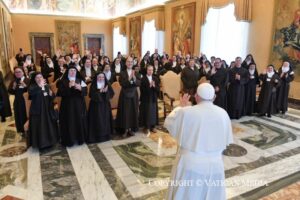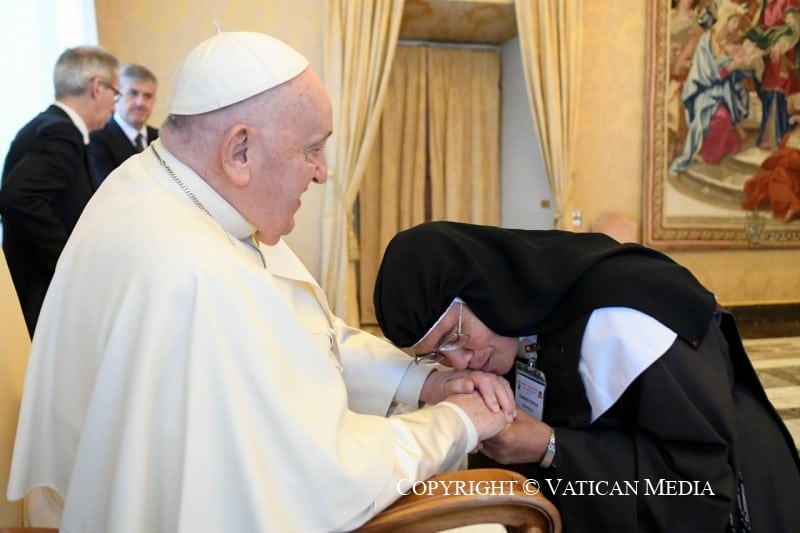This morning, in the Vatican Apostolic Palace, the Holy Father Francis received in the audience the Superiors and Delegates of the Discalced Carmelite Nuns. The Pope reminded the Discalced Carmelites that the Holy Mother teaches with her wisdom and with her ardent faith. She was convinced that the mystical and interior union with which God unites the soul to himself, as if “sealing” it with his love, permeates and transforms our entire life.
Speech by the Holy Father
Good morning and welcome!
I am going to speak to you in Spanish.
I am pleased to meet with you as you gather for reflection and work on the revision of your Constitutions, the prior ones from the 1990s, which you have been working on amongst yourselves. This is a significant undertaking, not only because it responds to a natural human need, the contingencies of community life, but also because it is a “season of the Spirit”, an occasion to devote yourselves to prayer and discernment. Remaining inwardly open to the working of the Holy Spirit, you are challenged to discover new language, new ways and new means to give greater impetus to the contemplative life that the Lord has called you to embrace, so that the charism of Carmel may be preserved – the charism which is always the same – and that it may become understood and attract many hearts, for the glory of God and the good of the Church. When a Carmel works well, it attracts, it attracts, doesn’t it? It is like light with flies, it attracts, it attracts.
Revising Constitutions means precisely this: recollecting the past – we must not deny this – in order to look to the future. Indeed, you make me think of how the contemplative vocation is not about tending embers, but rather about fanning into flame a fire that can continue to burn and provide warmth to the Church and the world. The memory of your history and the elements in the Constitutions that have matured over the years is thus a source of richness that needs to remain open to the promptings of the Holy Spirit, to the perennial newness of the Gospel and to the signs that the Lord shows us through the experiences of life and human challenges, and in this way a charism is preserved. It does not change, it listens and is open to what the Lord wants at every moment.
This is generally true for all Institutes of consecrated life, but you, as cloistered women, realize it in a particular way, because your lives embody the tension between separation from the world and immersion in it. Far from seeking refuge in interior spiritual consolations or a prayer divorced from reality, yours is a journey in which you allow yourselves to be touched by the love of Christ and union with him, so that his love can pervade your entire existence and find expression in all that you say and do. The path of contemplation is inherently a path of love. It serves as a ladder that raises us up to God, not to separate us from the world but to ground us more deeply in it, as witnesses of the love we have received.
This is the lesson that, with her wisdom and ardent faith, your holy Mother teaches you. She was convinced that the mystical and interior union by which God binds the soul to himself, “sealing” it, as it were, by his love, permeates and transforms our whole life, without ever withdrawing us from our daily responsibilities or suggesting a flight into spiritual matters alone. She made clear that time devoted to silence and prayer is necessary, yet need to be seen as the wellspring of the apostolate and of all the daily duties that the Lord calls us to carry out in service to the Church. As she says: “Martha and Mary must entertain our Lord and keep him as their guest, nor must they be so inhospitable as to offer him no food. How can Mary do this while she sits at his feet, if her sister does not help her? His food is that in every possible way we should draw souls to him so that they may be saved and may praise him forever” (SAINT TERESA OF AVILA, The Interior Castle VII, IV, 17-18). That is the quotation, which you know better than I do.
In this way, the contemplative life will not risk degenerating into a spiritual inertia that withdraws from the tasks of daily life – a priest who did not know this type of mysticism called them “the drowsy nuns”, who live in sleep – and it will continue to provide the interior light needed for discernment. And what is the light that you need to revise your Constitutions and address the many concrete problems of monasteries and of community life? That light is none other than the hope of the Gospel, yet always rooted in your founding fathers and your Mother foundress and in Saint John.

Evangelical hope differs from illusions based on human calculations. It entails surrendering ourselves to God, learning to read the signs he gives us to discern the future, having courage to make certain bold and risky decisions, even without knowing where they will eventually lead. Above all, it means not thinking only in human and defensive terms when reflecting on whether to preserve or close a monastery, on structures of community life, on vocations. Defensive strategies are often the fruit of a nostalgic longing for the past – that does not work, nostalgia does not work – whereas evangelical hope grants us joy in contemplating our history up to the present, but also empowers us to look ahead to the futurewith those roots that we have received. And that is called preserving the charism, the dream of moving forward, and that really works.
Look ahead. That is my wish for you. Look to the future with evangelical hope, with unshod feet, that is, with the freedom born of abandonment to God. Look to the future with roots in the past. May your complete immersion in the Lord’s presence always fill you with the joy of sisterhood and mutual love. May Our Lady accompany you on this path. With all my heart, I bless you, your deliberations in these days, and your communities. I bless the nuns in the monastery. I ask you, too, to continue to pray for me; for me, not against me.










